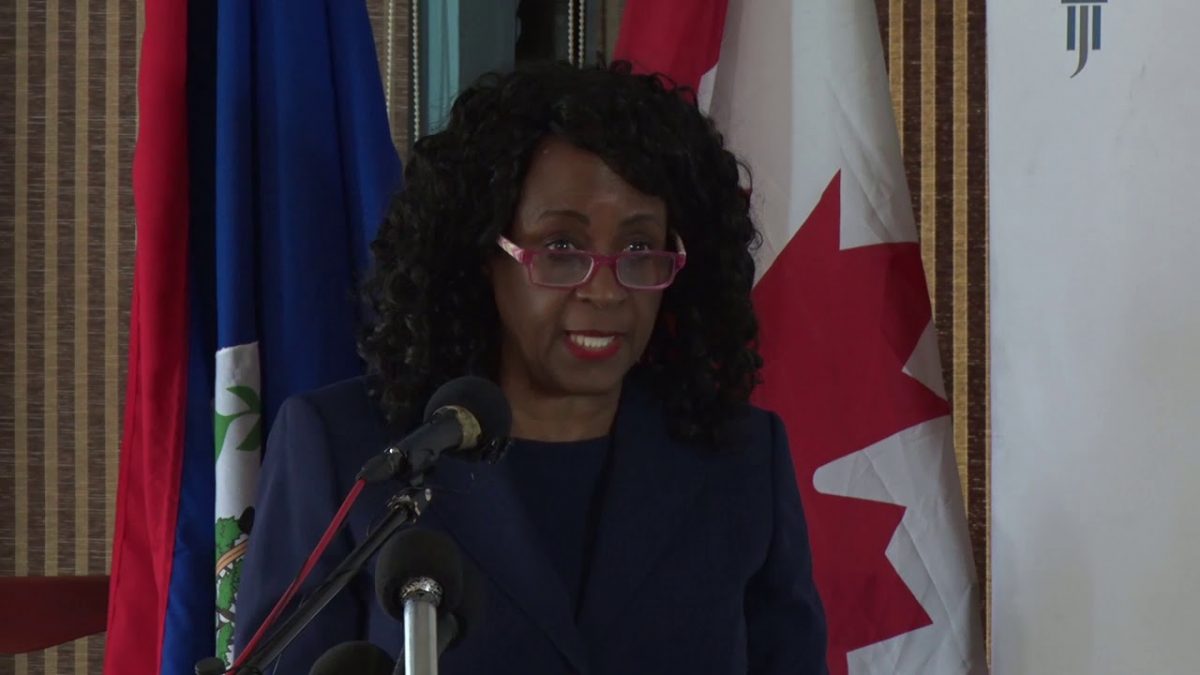In an effort to ensure that justice remains accessible, the Supreme Court of Judica-ture has embarked on a Public Education and Engagement Programme which allows the courts to continue functioning in keeping with the safety guidelines triggered by the COVID-19 pandemic.
The Canadian Government-funded campaign which is titled “We can still hear you” was launched under the Judicial Reform and Institutional Strengthening (JURIST) Project.
Under the campaign, the Supreme Court launched a website https://supremecourt.gy/ which provides mechanisms for matters to be filed online in an effort to reduce the need for visits to court registries. Through this and social media platforms, the public is also being kept informed about court information.
There was also an upgrade of signage around the court buildings that advises/ reminds citizens of COVID-19 safety guidelines.
Delivering remarks yesterday at the virtual launching, Chief Justice (acting) Roxane George-Wiltshire SC said the COVID-19 pandemic has changed the lives of many individuals and institutions including the courts.
However, despite the restrictions in place, she assured the public that the court system is still functioning and their matters are still being heard.
“Currently, matters are still being heard in all courts. All of our judicial officers – judges, commissioners of title, magistrates and registrars are working remotely, using online platforms, or in physical courtrooms depending on the circumstances of your case,” she said.
The Chief Justice noted that she has since pointed out that matters such as domestic violence applications should be categorized as “urgent” since they require special attention due to the risk to family members especially women and children.
She said that she also highlighted the recommencement of jury trials in an effort to seek to ensure that the accused, especially those in custody have their trials conducted in a ‘reasonable” time as mandated by the Constitution of Guyana.
Meanwhile, Chancellor of the Judiciary (acting) Justice Yonette Cummings-Edwards noted that the COVID-19 pandemic which hit Guyana in March this year disrupted the delivery of justice.
“……It made it difficult for matters to be filed, for cases to be heard, for decisions to be communicated and for remedies to be implemented. It prevented persons from accessing the courts because of the national stay-at-home and curfew orders. It also prevented members of the public with interest in this justice system from gaining physical access to the courts,” she explained.
Therefore, she said, whenever an issue is affecting the ability of the courts, measures should be taken immediately to respond quickly, safely and efficiently.
“Conscious of citizens’ need the Supreme Court took action to ensure that these matters could still be heard so that justice was neither delayed nor denied. We ensured that even though one had to maintain social distancing, there was no legal distance between you and the court and the matter to be heard. There was no legal isolation either,” she added.
`Wheels of justice keep turning’
During her address, outgoing High Commissioner of Canada to Guyana, Lilian Chatterjee said that the programme seeks to assure the public that the “wheels of justice keep turning” despite the challenges caused by the COVID-19 pandemic.
“All members of the judicial system, judges, lawyers and magistrates know the importance of the judicial branch in a democratic society. We have all seen the three-legged stool which depicts the judicial, legislative and executive branches of government as legs of a stool equally important in holding up democracy and good governance and certainly those in the profession know how critical the judicial branch is,” Chatterjee related.
According to Chatterjee, there is a need to bring the judicial system “to life”. “We have to bring to life the landmark decisions our courts have made over the years and the very real impact they had on society,” she said.
She added that a public which does not understand the value of the judicial branch will not be willing to render any support towards it, serve a role on the jury or even trust the decisions that come from the system.
“And a lack of trust and support in the system has great consequences. Educating the public about what courts, judges and lawyers do needs to start at an early age. It must start as part of primary school education and continue into high school and throughout adulthood,” Chatterjee stated.
Director of the JURIST project, Gloria Richards-Johnson said the campaign is a critical aspect which will work towards developing the capacities of judiciaries.
She said that the lack of confidence in the court systems throughout the region seems to “strike a chord” with the judiciary, the public and politicians. “The reality for most is that the courts don’t look like a responsive, transparent or accountable organization” Richards-Johnson noted.
The issue of confidence in the courts, according to Richards-Johnson needs to be seen in the larger context of changing perceptions and expectations of governments and government institutions.
“The idea that the voice of the public is important is rarely contested. What is the subject of fierce debate is what can be taken as a meaningful or accurate representation of that voice,” she said.
“The systemic and responsible engagement of the public provides an important means not only to provide greater legitimacy to the courts but also to protect them from political exploitation….. A legitimate public involvement would clearly seek to incorporate and harness the views of…the ordinary every-day citizen that does not have a particular axe to grind but is concerned with the things most citizens can be concerned with such as public safety and the integrity and fairness of the justice system,” Richards-Johnson added.






